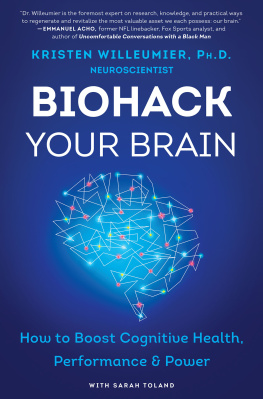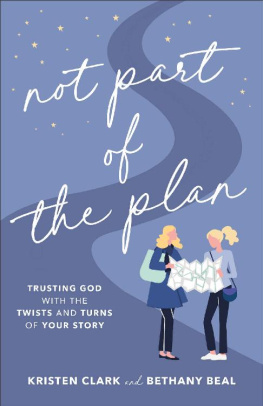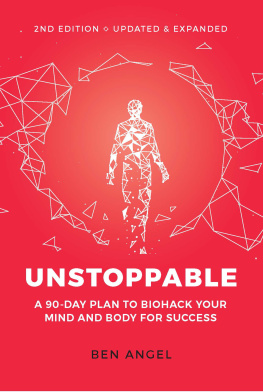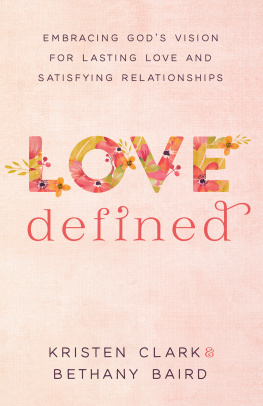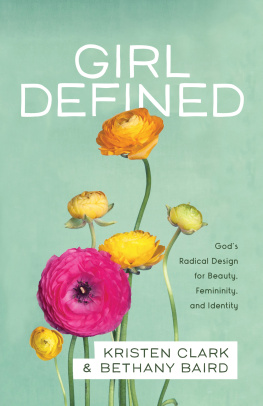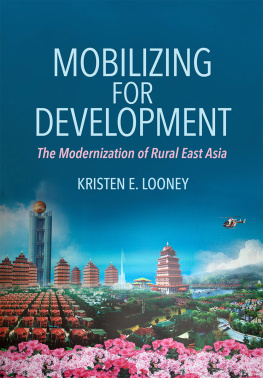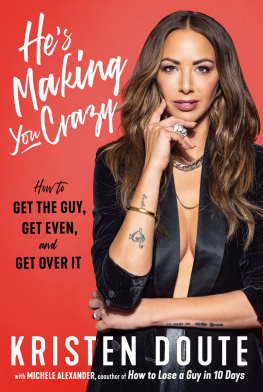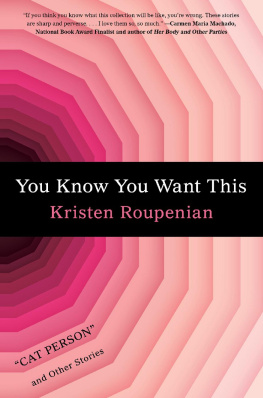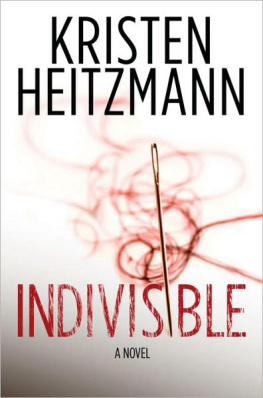Kristen Willeumier - Biohack Your Brain
Here you can read online Kristen Willeumier - Biohack Your Brain full text of the book (entire story) in english for free. Download pdf and epub, get meaning, cover and reviews about this ebook. year: 2020, publisher: William Morrow, genre: Romance novel. Description of the work, (preface) as well as reviews are available. Best literature library LitArk.com created for fans of good reading and offers a wide selection of genres:
Romance novel
Science fiction
Adventure
Detective
Science
History
Home and family
Prose
Art
Politics
Computer
Non-fiction
Religion
Business
Children
Humor
Choose a favorite category and find really read worthwhile books. Enjoy immersion in the world of imagination, feel the emotions of the characters or learn something new for yourself, make an fascinating discovery.
- Book:Biohack Your Brain
- Author:
- Publisher:William Morrow
- Genre:
- Year:2020
- Rating:5 / 5
- Favourites:Add to favourites
- Your mark:
- 100
- 1
- 2
- 3
- 4
- 5
Biohack Your Brain: summary, description and annotation
We offer to read an annotation, description, summary or preface (depends on what the author of the book "Biohack Your Brain" wrote himself). If you haven't found the necessary information about the book — write in the comments, we will try to find it.
Biohack Your Brain — read online for free the complete book (whole text) full work
Below is the text of the book, divided by pages. System saving the place of the last page read, allows you to conveniently read the book "Biohack Your Brain" online for free, without having to search again every time where you left off. Put a bookmark, and you can go to the page where you finished reading at any time.
Font size:
Interval:
Bookmark:
To the awakening of greater health and well-being for all of humanity.
This book was written in loving memory of my parents, who provided an environment that encouraged scientific exploration, creativity, independent thinking, and the pursuit of higher knowledge. My father, a proud marine and firefighter, loved serving his country and community and lived the final decade of his life with a neurological condition. May the memory of his strength, courage, optimism, faith, and perseverance live on throughout the pages of this book and touch the hearts and minds of all who read it.
When I met Kristen, I was looking for a neuroscientist who understood cognitive analytics to work on a research trial identifying dementia in asymptomatic patients. Kristen was ideally qualified, having both a broad base of knowledge in cognitive science and the unique experience of running research for a large brain-imaging clinic for years.
Our research team for the trial included many eminent doctors, neuropsychiatrists, and similar sorts. But from the onset, there was something special about Kristenshe was committed, driven, and determined to find solutions, which was all apparent from the moment I met her. Nonetheless, I was still surprised when she brought testing tools into our trial that not even the neuropsychiatrists who regularly relied on them had thought of. These were tools I hadnt thought of, either.
Ive spent more than forty years studying and treating the brain. Ive conducted numerous clinical trials and have been fortunate enough to be recognized for my work, including on the cover of Time magazines Heroes of Medicine issue. You can imagine then how much Kristen impressed me when she showed a cognitive-health vet like me how things might be done differently.
Kristen is absolutely a committed and compassionate spokesperson for the brain. Not many neuroscientists and neurosurgeons can communicate clearly about what we can do to improve cognitive function, but she is concise and compassionate, and she speaks about the brain in a language everyone can understand.
When it comes to the brain, clear communication is increasingly invaluable. Over the past decade, weve seen more and more information disseminated about what we can allegedly do to optimize our cognitive health. Every time you open your news feed, theres another articlewhats good, whats bad, what you should take and shouldnt take.
Much of this information, however, isnt based on good scientific data. If you search Google, for example, youll find hundreds of supplements claiming to improve cognitive function, even though few have quality research supporting these claims. Ive often wished I had a handbook I could give patients that outlined the interventions we actually know can improve brain health.
I now have one. BiohackYour Brain leverages what research has shown to optimize cognitive health. This is relatively new science and continually evolving, which is why its critical to get advice from a trusted source. Weve only recently learned, for example, that diet, exercise, mindfulness, sleep, and stress regulation play a big role in cognitive functionand in different ways than they do in heart health. And we now know certain lifestyle interventions can slow the risk of developing dementia by as much as a decade.
If you only plan to live until youre forty, this book may not help you. But if you want to live as long and as well as you can, BiohackYour Brain can have a significant impact on both your cognitive health and overall quality of life.
In other words, you can biohack your brain if you have the right resources and information to do so. Personally, I cant think of anyone more qualified to show us the best ways to biohack the brain than Kristen. Shes even taught me a thing or two.
Keith L. Black, M.D., chair and professor, Department of Neurosurgery, Cedars-Sinai Medical Center
The Case for Your Cognitive Health
The gospel of health and wellness is everywhere these days. You hear about the newest trends and solutions espoused by medical businesses, books, websites, food and fitness companies, hospitals, and health conglomerates. They all tell you to join a gym, try a diet, take these supplements, lose weight, lower cholesterol, drop blood pressure, get heart-healthy, prevent cancer... the noise can be deafening.
Amid all this, we dont hear nearly enough about the brainthe only organ in the body we cant live without, the one that orchestrates our entire lives.
Ive been fascinated by the brain ever since I was a psychology major at Boston College. After earning my bachelors degree, I was inspired to continue my education, getting a masters degree in physiological science and a doctoral degree in neurobiology from the University of California, Los Angeles.
During my graduate and postgraduate work, I spent years in research labs studying neuroendocrinology, neurophysiology, and neurogenetics. During this time, I was awarded a fellowship from the National Institutes of Health, which opened up opportunities to present my research at conferences around the world.
Following my postdoctoral training, I went into the field of brain imaging, taking the role of research director for the Amen Clinics, a nationally recognized mental health care center for the study of the brain. My time there changed my lifeand the lives of many others. It was at the clinic that I helped lead several clinical trials with NFL players that revealed just how much cognitive damage the sport can causea groundbreaking conclusion at the time when my colleagues and I published our results. More important, we discovered noninvasive ways to help treat and even reverse some of the damage we saw by using diet, supplements, exercise, and cognitive training.
Later, I was lucky enough to be able to use the knowledge gleaned from those trials to help my father, who passed away in 2017 after years of living with symptoms associated with Parkinsons disease. While it was incredibly painful to watch his condition progress, I was able to hold on to hope knowing that I did have some tools to help him retain his quality of life. As his condition worsened, I encouraged him to adopt some of the techniques we used with the NFL players to help heal their brains. It was incredible to see how his balance and grip improvedsuch that he was able to hold on to some independence until the very end. To this day, Im so heartened that I was able to give him some tools to make his last years more pleasant and full of hope.
This story epitomizes the number one lesson Ive learned in my twenty-plus years of study: everyone has the potential to change his or her brain. No matter how old you are or the choices youve made in the past, it is always possible to make improvements.
Today, after all, millions of Americans contend with cognitive issues. Many blame symptoms like memory loss, brain fog, poor concentration, anxiety, and depression on physical problems when the real root is brain based. It can be easy to dismiss cognitive problems as the by-product of stresswhich, admittedly, is everywhere. Still, that doesnt mean you have to let it derail your cognitive performance. There are several science-backed ways to release stresss grip on the brain in order to restore your cognitive power and potential.
If youre concerned with dementia, you have every right to be. The umbrella term for cognitive impairment currently impacts 10 percent of all Americans over the age of sixty-fivea statistic expected to grow as the country ages. Cellular changes that lead to dementia can occur decades earlier, even as early as your thirties and forties, which is when the brain begins to age. This makes it the perfect time to care for your brain now, no matter how old you are, leveraging the time when you can make changes in your brain health habits in order to circumvent a dementia diagnosis later in life.
Font size:
Interval:
Bookmark:
Similar books «Biohack Your Brain»
Look at similar books to Biohack Your Brain. We have selected literature similar in name and meaning in the hope of providing readers with more options to find new, interesting, not yet read works.
Discussion, reviews of the book Biohack Your Brain and just readers' own opinions. Leave your comments, write what you think about the work, its meaning or the main characters. Specify what exactly you liked and what you didn't like, and why you think so.

